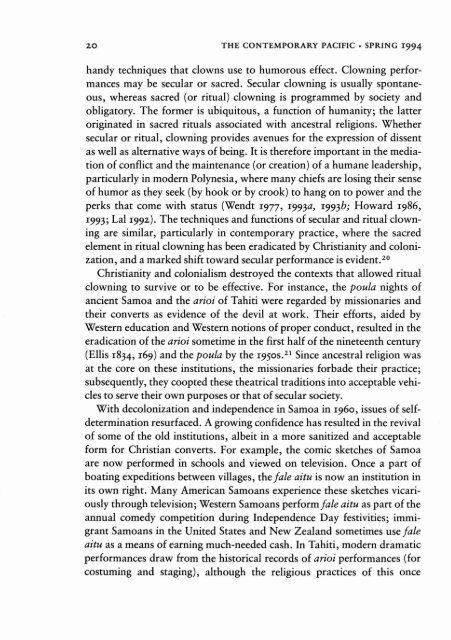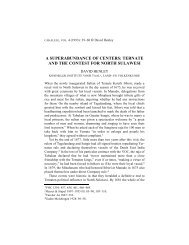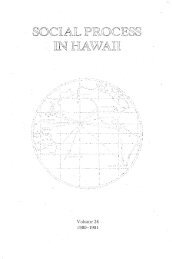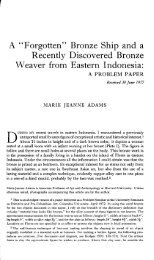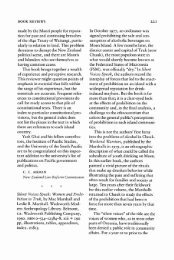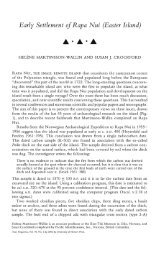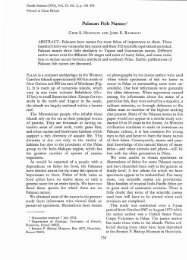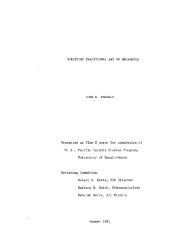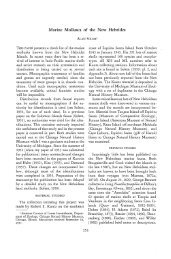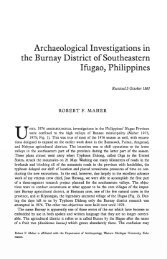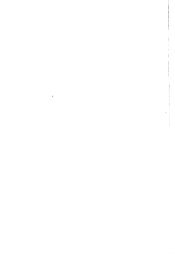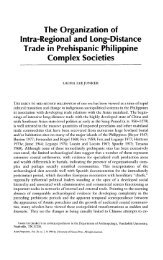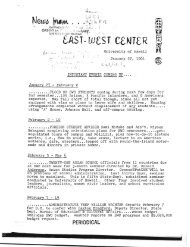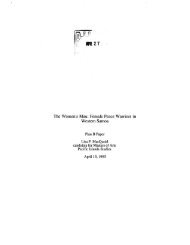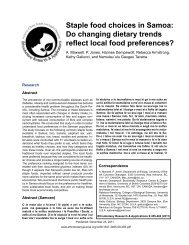Clowning as Political Commentary: Polynesia, Then ... - ScholarSpace
Clowning as Political Commentary: Polynesia, Then ... - ScholarSpace
Clowning as Political Commentary: Polynesia, Then ... - ScholarSpace
You also want an ePaper? Increase the reach of your titles
YUMPU automatically turns print PDFs into web optimized ePapers that Google loves.
20 THE CONTEMPORARY PACIFIC· SPRING 1994<br />
handy techniques that clowns use to humorous effect. <strong>Clowning</strong> performances<br />
may be secular or sacred. Secular clowning is usually spontaneous,<br />
where<strong>as</strong> sacred (or ritual) clowning is programmed by society and<br />
obligatory. The former is ubiquitous, a function of humanity; the latter<br />
originated in sacred rituals <strong>as</strong>sociated with ancestral religions. Whether<br />
secular or ritual, clowning provides avenues for the expression of dissent<br />
<strong>as</strong> well <strong>as</strong> alternative ways of being. It is therefore important in the mediation<br />
of conflict and the maintenance (or creation) of a humane leadership,<br />
particularly in modern <strong>Polynesia</strong>, where many chiefs are losing their sense<br />
of humor <strong>as</strong> they seek (by hook or by crook) to hang on to power and the<br />
perks that come with status (Wendt 1977, 1993a, 1993b; Howard 1986,<br />
1993; Lal 1992). The techniques and functions of secular and ritual clowning<br />
are similar, particularly in contemporary practice, where the sacred<br />
element in ritual clowning h<strong>as</strong> been eradicated by Christianity and colonization,<br />
and a marked shift toward secular performance is evident. 20<br />
Christianity and colonialism destroyed the contexts that allowed ritual<br />
clowning to survive or to be effective. For instance, the poula nights of<br />
ancient Samoa and the arioi of Tahiti were regarded by missionaries and<br />
their converts <strong>as</strong> evidence of the devil at work. Their efforts, aided by<br />
Western education and Western notions of proper conduct, resulted in the<br />
eradication of the arioi sometime in the first half of the nineteenth century<br />
(Ellis 1834, 169) and the poula by the 1950S.21 Since ancestral religion w<strong>as</strong><br />
at the core on these institutions, the missionaries forbade their practice;<br />
subsequently, they coopted these theatrical traditions into acceptable vehicles<br />
to serve their own purposes or that of secular society.<br />
With decolonization and independence in Samoa in 1960, issues of selfdetermination<br />
resurfaced. A growing confidence h<strong>as</strong> resulted in the revival<br />
of some of the old institutions, albeit in a more sanitized and acceptable<br />
form for Christian converts. For example, the comic sketches of Samoa<br />
are now performed in schools and viewed on television. Once a part of<br />
boating expeditions between villages, the fale aitu is now an institution in<br />
its own right. Many American Samoans experience these sketches vicariously<br />
through television; Western Samoans perform fale aitu <strong>as</strong> part of the<br />
annual comedy competition during Independence Day festivities; immigrant<br />
Samoans in the United States and New Zealand sometimes use fale<br />
aitu <strong>as</strong> a means of earning much-needed c<strong>as</strong>h. In Tahiti, modern dramatic<br />
performances draw from the historical records of arioi performances (for<br />
costuming and staging), although the religious practices of this once


